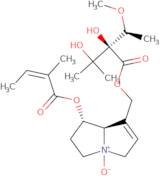
Lasiocarpine N-oxide
CAS: 127-30-0
Ref. 3D-FL168447
| 1mg | 334.00 € | ||
| 2mg | 471.00 € | ||
| 5mg | 628.00 € | ||
| 10mg | 932.00 € | ||
| 25mg | 1,753.00 € |
Product Information
- 2-Butenoic acid, 2-methyl-, (1S,7aR)-7-(((2R)-2,3-dihydroxy-2-((1S)-1-methoxyethyl)-3-methyl-1-oxobutoxy)methyl)-2,3,5,7a-tetrahydro-4-oxido-1H-pyrrolizin-1-yl ester, (2Z)-
- 2-Butenoic acid, 2-methyl-, (1S,7aR)-7-[[(2R)-2,3-dihydroxy-2-[(1R)-1-methoxyethyl]-3-methyl-1-oxobutoxy]methyl]-2,3,5,7a-tetrahydro-4-oxido-1H-pyrrolizin-1-yl ester, (2Z)-
- 2-Butenoic acid, 2-methyl-, 7-[[2,3-dihydroxy-2-(1-methoxyethyl)-3-methyl-1-oxobutoxy]methyl]-2,3,5,7a-tetrahydro-1H-pyrrolizin-1-yl ester, N-oxide, [1S-[1α(Z),7[S*(R*)],7aα]]-
- 7-({[2,3-dihydroxy-2-(1-methoxyethyl)-3-methylbutanoyl]oxy}methyl)-4-oxido-2,3,5,7a-tetrahydro-1H-pyrrolizin-1-yl (2E)-2-methylbut-2-enoate (non-preferred name)
- Brn 0060898
- Lasiocarpine oxide
- Lasiocarpine, 4-oxide
- 4-21-00-02054 (Beilstein Handbook Reference)
- Lasiocarpine, N-oxide
Lasiocarpine N-oxide is a metabolite of lasioprol, which is used in the treatment of chronic hepatitis. It is an acidic compound with a molecular weight of 242.2 and a melting point of 228-229°C. Lasiocarpine N-oxide is the n-oxide form of retrorsine and has been found to be taken up into liver cells in vivo by a carrier-mediated mechanism. The compound has been identified by liquid chromatography coupled with tandem mass spectrometry (LC-MS/MS) as one of the major metabolites in human liver microsomes, suggesting that this metabolite can be used as an analytical marker for human liver enzymes. Lasioprol is an intermedin derivative that inhibits mitochondrial respiration, leading to decreased ATP production, which may cause fatigue and other side effects.
Chemical properties
Technical inquiry about: 3D-FL168447 Lasiocarpine N-oxide
If you want to request a quotation or place an order, please instead add the desired products to your cart and then request a quotation or order from the cart. It is faster, cheaper, and you will be able to benefit from the available discounts and other advantages.





